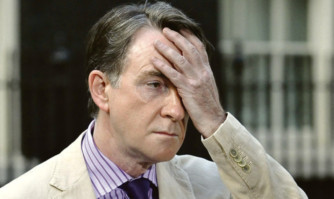
Ed Miliband gets tough. The headline writers were clearly amazed.
Nice, gentle, cuddly, polite Ed says a new Labour Government would bash the energy giants to save households £120 a year on energy bills.
True the Labour leader still faces the minor task of getting elected Prime Minister. But his get-tough promise was serious enough to knock a cool £1 billion from Centrica share prices and even more gratifying to annoy the heck out of prickly old Peter Mandelson. Labour’s one-time Business Secretary warned a 20-month energy price freeze would send Britain into a time warp, back to the scary 1970s when governments ran vital industries like energy, water and rail and Margaret Thatcher had yet to flog off the family silver. Actually, what’s not to like?
Nobody in Scotland needs lectures about fuel poverty. Gas, coal, oil, hydro, wind and soon tidal power-rich Scotland still has old folk and young families choosing whether to be cold or hungry. And experts now agree dampness caused by poorly ventilated, hard to heat homes contributes to the “Scottish Effect” where Scots die sooner than folk on similar incomes in the rest of the UK. That’s nothing short of scandalous. Household energy bills have risen by an extraordinary £300 since 2010 while the big six energy companies have raked in £12 billion profits.
So anything that halts the great energy rip-off is welcome.
But there are snags. Any date for a price freeze gives wily operators the chance to hike prices ahead of time. David Cameron faced just such a problem a year back when he said energy companies would be forced to charge customers their lowest tariffs.
Energy Secretary Ed Davey later admitted that energy bills would be simpler but not cheaper and the idea withered on the vine.
There’s a bigger snag. As long as you only care about GDP it doesn’t matter if a few folk make big wonga while others live in fuel poverty. It all generates “economic activity”, stock market interest, and jobs in the City. Of course it isn’t morally right. But since Thatcher no one has really cared if unregulated markets deliver fairness or real competition.
Will Ed be bold enough to tackle that and successfully woo Middle England? I hae ma doots.
So why wait for 2015 and the uncertain prospect of an overall Labour victory?
There’s another way to cut energy bills right now collective switching. Folk opt into an auction to see which energy supplier offers the lowest price. “Group purchasing” like this in Belgium generally knocks 25% off energy prices. Tidy.
An incredible 41% of us have never switched energy supplier because we aren’t sure how, don’t have time to compare tariffs and doubt better deals will stay that way for very long. But if a trusted authority takes the initiative to make switching safe and easy they can give punters a better deal for years.
It’s already happening. The Eden Project in Cornwall is behind a scheme with 20,000 members set to save a whopping £3.7 million when their switch goes ahead. Almost 5,000 Liverpudlians just saved £110 apiece the same way. Labour MSP Jenny Marra launched the first Scottish scheme last year folk saved an average £154.
So why the heck isn’t every council, housing association and Scottish Government-backed collective switching in every community right now? Hard-pressed consumers could find they’re running the market together not being steam-rollered by it.
All that’s holding us back are red tape and lack of leadership.
Alex Salmond and Scotland’s councils over to you.

Enjoy the convenience of having The Sunday Post delivered as a digital ePaper straight to your smartphone, tablet or computer.
Subscribe for only £5.49 a month and enjoy all the benefits of the printed paper as a digital replica.
Subscribe